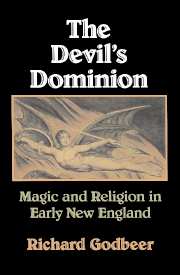Book contents
- Frontmatter
- Contents
- Acknowledgments
- Prologue
- Introduction
- 1 Magical Experiments: Divining, Healing, and Destroying in Seventeenth-Century New England
- 2 The Serpent that Lies in the Grass Unseen: Clerical and Lay Opposition to Magic
- 3 Entertaining Satan: Sin, Suffering, and Countermagic
- 4 Sinful Curiosity: Astrological Discourse in Early New England
- 5 Insufficient Grounds of Conviction: Witchcraft, the Courts, and Countermagic
- 6 Rape of a Whole Colony: The 1692 Witch Hunt
- Epilogue
- Appendix A Witchcraft Trials in Seventeenth-Century New England (Excluding Persons Accused During the Salem Witch Hunt)
- Appendix B Persons Accused During the Salem Witch Hunt
- Name Index
- Subject Index
Introduction
Published online by Cambridge University Press: 05 October 2010
- Frontmatter
- Contents
- Acknowledgments
- Prologue
- Introduction
- 1 Magical Experiments: Divining, Healing, and Destroying in Seventeenth-Century New England
- 2 The Serpent that Lies in the Grass Unseen: Clerical and Lay Opposition to Magic
- 3 Entertaining Satan: Sin, Suffering, and Countermagic
- 4 Sinful Curiosity: Astrological Discourse in Early New England
- 5 Insufficient Grounds of Conviction: Witchcraft, the Courts, and Countermagic
- 6 Rape of a Whole Colony: The 1692 Witch Hunt
- Epilogue
- Appendix A Witchcraft Trials in Seventeenth-Century New England (Excluding Persons Accused During the Salem Witch Hunt)
- Appendix B Persons Accused During the Salem Witch Hunt
- Name Index
- Subject Index
Summary
Seventeenth-century New Englanders used magic to predict the future, to heal the sick, to destroy their enemies, and to defend themselves against occult attack.
Rebecca Johnson of Andover, Massachusetts, was worried about her brother, whom she feared was dead. Johnson had her daughter balance a sieve on a pair of shears and ask “if her brother Moses Haggat was alive or dead.” If the sieve turned, they would know he was dead. And so it did.
Dorcas Hoar of Beverly, Massachusetts, used palmistry to divine the future. She borrowed a book on the subject from one of her neighbors, a book with “many streaks and pictures in it.”
A healer in Boston provided one of his patients with a charm that he promised would cure the tooth-ache. It was apparently “a usual thing for People to cure Hurts with Spells.”
Goodwife Glover, a Bostonian charged with witchcraft, admitted that she tormented her enemies by stroking rag dolls that she made to represent them. Court officials were sent to her house and returned with several of these dolls.
Henry Grey, a Connecticut farmer, was convinced that his ailing heifer had been bewitched and so flogged the beast in order to injure the person responsible. Sure enough, a neighbor whom he suspected collapsed in agony.
When Michael Smith informed some of his neighbors in Boston that he feared he was under an evil hand, they took some of Smith's urine and closed it in a bottle. […]
- Type
- Chapter
- Information
- The Devil's DominionMagic and Religion in Early New England, pp. 7 - 23Publisher: Cambridge University PressPrint publication year: 1992



